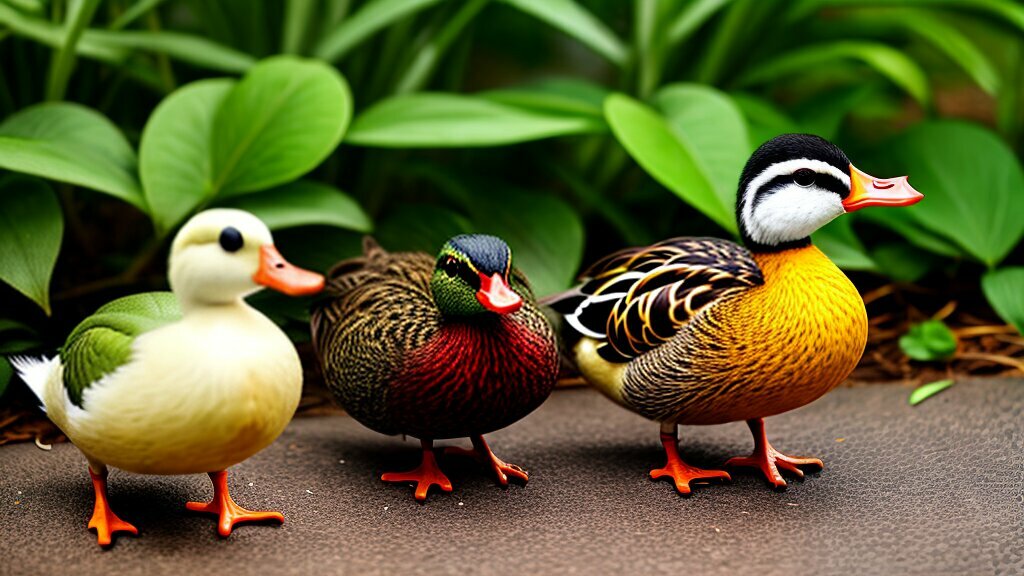Can Ducks Have Celery?

Table of content:
- What Type of Vegetables Can I Feed My Ducks?
- Is Celery Safe for Ducks to Eat?
- Do Wild Ducks Eat Celery in Nature?
- How Much Celery Can I Feed My Ducks?
- Will Celery Hurt My Ducks If They Eat It?
- Do Ducks Prefer the Leaves or Stalks of Celery?
- Is Celery Appropriate for Baby Ducklings?
- What Are the Benefits of Celery for Ducks?
- Should I Chop Up Celery Before Feeding It to My Ducks?
- Is It Okay to Give My Ducks Celery Daily?
- Final Thoughts
Celery is a healthy and nutritious vegetable that can be fed to ducks in moderation. Celery contains important vitamins, minerals, and fiber that provide ducks with many health benefits. However, ducks have different dietary requirements than humans, so it’s important to understand how much celery to feed ducks and how to prepare it properly for them to enjoy.
What Type of Vegetables Can I Feed My Ducks?
Ducks are omnivores, meaning they eat both plant and animal materials. Here are some of the best vegetables you can offer ducks:
- Leafy Greens: Lettuce, kale, spinach, swiss chard
- Root Vegetables: Carrots, sweet potatoes, turnips
- Squashes: Zucchini, pumpkin, butternut squash
- Fruits: Strawberries, blueberries, melon, apple slices
Vegetables provide important vitamins, minerals, and fiber. Focus on variety and rotate different produce to give ducks diverse nutrients. Wash all vegetables thoroughly before feeding.
Is Celery Safe for Ducks to Eat?
Yes, celery is safe for ducks to eat. Celery contains vitamins K, A, B6, C, and fiber. It also provides potassium, folate, calcium, and magnesium; all beneficial nutrients for duck health.
Celery is safe for most ducks when introduced properly. Check for any signs of intestinal upset when first offering celery, like loose droppings. This indicates the duck isn’t tolerating it well. Otherwise, celery is perfectly healthy for ducks.
Do Wild Ducks Eat Celery in Nature?
Wild ducks forage on a wide assortment of greens, seeds, aquatic plants, and insects. This provides them with all the nutrients they need. Though celery itself doesn’t grow near ponds where wild ducks live, they do consume other similar marsh plants.
Wild ducks have been observed snacking on certain garden vegetables if available to them. However, celery likely doesn’t compose a major part of a wild duck’s diet. Domestic ducks can enjoy celery as a supplemental treat in addition to a balanced diet.
How Much Celery Can I Feed My Ducks?
When feeding celery to ducks, moderation is key. About 1-2 stalks per duck are sufficient daily. Chop the celery stalks and leaves into bite-size pieces before feeding to prevent choking.
Too much celery can lead to diarrhea since ducks don’t digest significant fiber well. Celery also contains oxalates, compounds that bind minerals like calcium. Large oxalate intake can cause nutritional deficiencies. Feed a balanced diet and use celery as one part of the variety.
Will Celery Hurt My Ducks If They Eat It?
Celery is not toxic or poisonous to ducks. However, rotting produce should always be avoided, as it can grow mold that causes illness. Serve fresh celery within a day or two of purchasing it.
Make sure to chop celery to prevent choking. Whole, stringy stalks can get stuck in a duck’s throat. Also, introduce new veggies slowly to check for any intestinal issues. Diarrhea or loose stool means the duck isn’t tolerating the new food well.
Overall, clean, fresh celery free of rot or mold is a nutritious addition to a duck’s diet. Introduce small amounts at first and watch stool consistency. As long as the duck appears healthy, celery can be fed 2-3 times a week without issue.
Do Ducks Prefer the Leaves or Stalks of Celery?
Ducks will readily eat all parts of celery – both the leafy greens and the crisp stalks. Celery stalks provide hydration and crunch, while the leaves supply additional fiber and nutrients.
For young ducklings, chop the celery stalks into small, manageable pieces. They may have difficulty swallowing strings or chewing the crunchy veins. Chop the leaves to make them easier to eat as well. Older ducks can handle larger stalk pieces and whole leaves.
Offer both celery stalks and leaves to satisfy different textural preferences. The leaves tend to be more palatable when served freshly picked. If they wilt, ducks may reject them. Feed a mix to ensure ducks get well-rounded nutrients from the entire celery plant.
Is Celery Appropriate for Baby Ducklings?
Celery can be fed to ducklings once they are 2-3 weeks old. Their digestive systems take time after hatching to mature enough to handle fiber and vegetation.
Chop celery very small to prevent choking. A good size is around 1⁄4 inch cubes or thinner matchsticks. Also, mix in some crumbled hard-boiled egg yolk or chick starter feed so ducklings get enough protein. Offer just a few small pieces at first to observe stool consistency.
As ducklings grow, increase celery portion size gradually. By 6-8 weeks old, they can eat chopped stalks and leaves with the adult ducks. Feed celery along with duckling feed and insects for a balanced diet.
What Are the Benefits of Celery for Ducks?
Here are some of the top nutrients celery provides:
- Vitamin K – Essential for blood clotting. Also supports bone health.
- Vitamin A – Important for immune function and eyesight. An antioxidant.
- Vitamin C – Boosts immunity and collagen production. Also an antioxidant.
- B Vitamins – Aid carbohydrate, protein, and lipid metabolism for energy.
- Potassium – Helps nerves and muscles function. Also regulates fluid balance.
- Folate – Crucial for new cell and DNA production.
- Calcium – Necessary for bone strength, nerve transmission, and muscle contraction.
- Magnesium – Involved in over 300 enzymatic reactions. Supports metabolism and circulation.
The fiber and water content in celery also benefits digestion and hydration. The antioxidants boost immunity against illness and inflammation. Overall, when fed properly, celery is a healthy supplemental food for ducks.
Should I Chop Up Celery Before Feeding It to My Ducks?
Definitely chop celery before feeding it to ducks. The long fiber strands and crunchy veins can be difficult for ducks to chew and properly digest. Smaller pieces are safer and easier for ducks to eat.
For adult ducks, chop the stalks into 1/2-inch pieces. Slice the leaves into smaller strips as well. This makes it easier to swallow without choking on the fibrous strings.
For young ducklings, finely mince the celery or grate it to create a “mash.” Ducklings have tiny beaks and immature digestive systems. They may struggle to swallow and digest larger chunks. Keep celery pieces around 1⁄4 inch or smaller for baby ducks.
Chopping celery before feeding allows ducks to safely enjoy the crunchy veggie and get the most nutritional value from it. Processing it to the proper size prevents choking hazards or indigestion.
Is It Okay to Give My Ducks Celery Daily?
It’s best to feed celery in moderation 2-3 times per week, rather than daily. While nutritious, too much celery may cause loose droppings due to excess fiber.
Rotate celery with other fresh produce like kale, carrots, squash, and berries. Feed a diverse mix of plants to give ducks a range of vitamins, minerals, and antioxidants. Avoid exclusively feeding one item daily, even healthy options like celery.
Also, celery contains oxalates. These bind to calcium and can potentially cause deficiencies if large amounts are eaten regularly. Keep celery as part of a varied diet to limit oxalate levels. Offer just a few stalks and leaves a few times a week as a supplemental treat.
Final Thoughts
Celery can be a healthy, nutritious addition to a duck’s diet when fed properly. Its crisp, hydrating stalks and vitamin-rich leaves provide important nutrients like vitamins A, B, C, and K. It also supplies antioxidants, minerals, and fiber that benefit duck health and digestion.
However, moderation is key. Offer just a few stalks and leaves 2-3 times per week at most. Chop the celery to prevent choking hazards. Introduce it slowly and watch for loose droppings as a sign of indigestion. Rotate celery with other fresh fruits and veggies for balanced nutrition.
By following these tips, you can safely feed your ducks celery as an occasional supplemental treat that gives them nutrients and enjoy a tasty, crunchy snack. Celery can be part of a diverse diet that keeps ducks healthy and thriving.
Welcome. I’m Adreena Shanum, the proud owner of this website, and I am incredibly passionate about animals, especially poultry. I founded adreenapets.com as a labor of love, stemming from my desire to share my knowledge and experiences with poultry enthusiasts worldwide.




